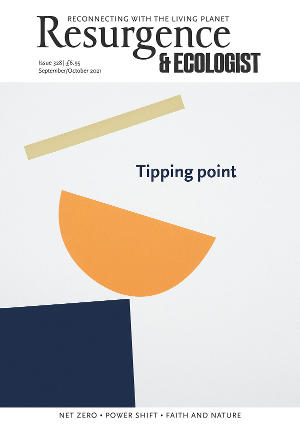You can see sometimes, in the posher parts of London, a house front garden boarded up as its foundations are dug out and replaced with a new basement. Jeremy Lent, in his new book The Web of Meaning, wants to do something similar with western civilisation. But rather than a vanity project, he argues that the new foundations are essential to prevent the whole structure from collapse.
A sequel to The Patterning Instinct – praised by George Monbiot as “the most profound, brilliant and potentially world-changing book I’ve read this century” – Lent’s new book seeks to combine Indigenous wisdom and the latest science in order to chart a path towards an ecological civilisation. It is an audacious, valuable and at times mind-twisting synthesis of progressive thinking organised around simple questions such as “What Am I?”, “Why Am I?”, and “Where Are We Going?”
Lent has integrated a huge range of knowledge, from Confucianism to cell biology, from Indigenous knowledge to neuroscience, and from Taoism to complexity theory. He writes with urgency and grief at the damage done to the living world, but also with balance – engaging seriously with counter-arguments. Like raisins in a bun, well-crafted little stories make the philosophically taxing subject matter more enticing.
The book’s core message was simply expressed by Martin Luther King Jr. more than fifty years ago: “All I’m saying is simply this: that all mankind is tied together; all life is interrelated.” Global society, Lent says, is on the cusp of a major, and necessary, transition. To guide it, we need a deep moral transformation based on firm foundations. He finds these in the intrinsic interconnectedness of the universe: what Thích Nhất Hạnh calls ‘interbeing’. Policy fixes will not get us to where we need to go. The new values are not really new, but a refresh of traditional and Indigenous wisdom confirmed by systems science. The change in worldview is as easy and as difficult as opening our eyes to “our true nature as humans on this Earth”.
What has led civilisation to the brink of catastrophe, Lent says, is too much faith in reductionism, the idea that know-ledge only comes from breaking the world up into smaller and smaller pieces. This has led to a society dislocated from Nature, with people often alienated from each other. The antidote is to know that the relations between things are often more crucial than the things themselves. Just as music, life and consciousness emerge from connectedness, so, Lent argues, can a sense of meaning.
It’s a visionary blast to conventional thinking, and in large part it convinces. I am less keen on Lent’s description of humans and other living beings as “patterns of energy flows” or “negative entropy”. This strikes me, ironically, as reductionist. There is also the occasional historical quotation taken out of context. But the bigger question is whether the house – our civilisation – would stay standing while its foundations were being dug up and replaced. Lent would surely say that we don’t have a choice.
What would the finished renovation look like? Lent sketches out a blueprint in the final chapter, packed with good ideas, but for the detailed plans you’ll have to wait for his third book. This will be based on the inspiring concept of an ecological civilisation: one that learns to live in symbiosis with the rest of life. I’m looking forward to Lent’s ideas on how power in the global system – economic, political, and other – can be repatterned to make that a reality. Already, the dialogue he’s started between disciplines and between science and spirituality – in the tradition of E.F. Schumacher and Fritjof Capra – has brought closer the possibility of ecological sanity. For that, we can be grateful.







